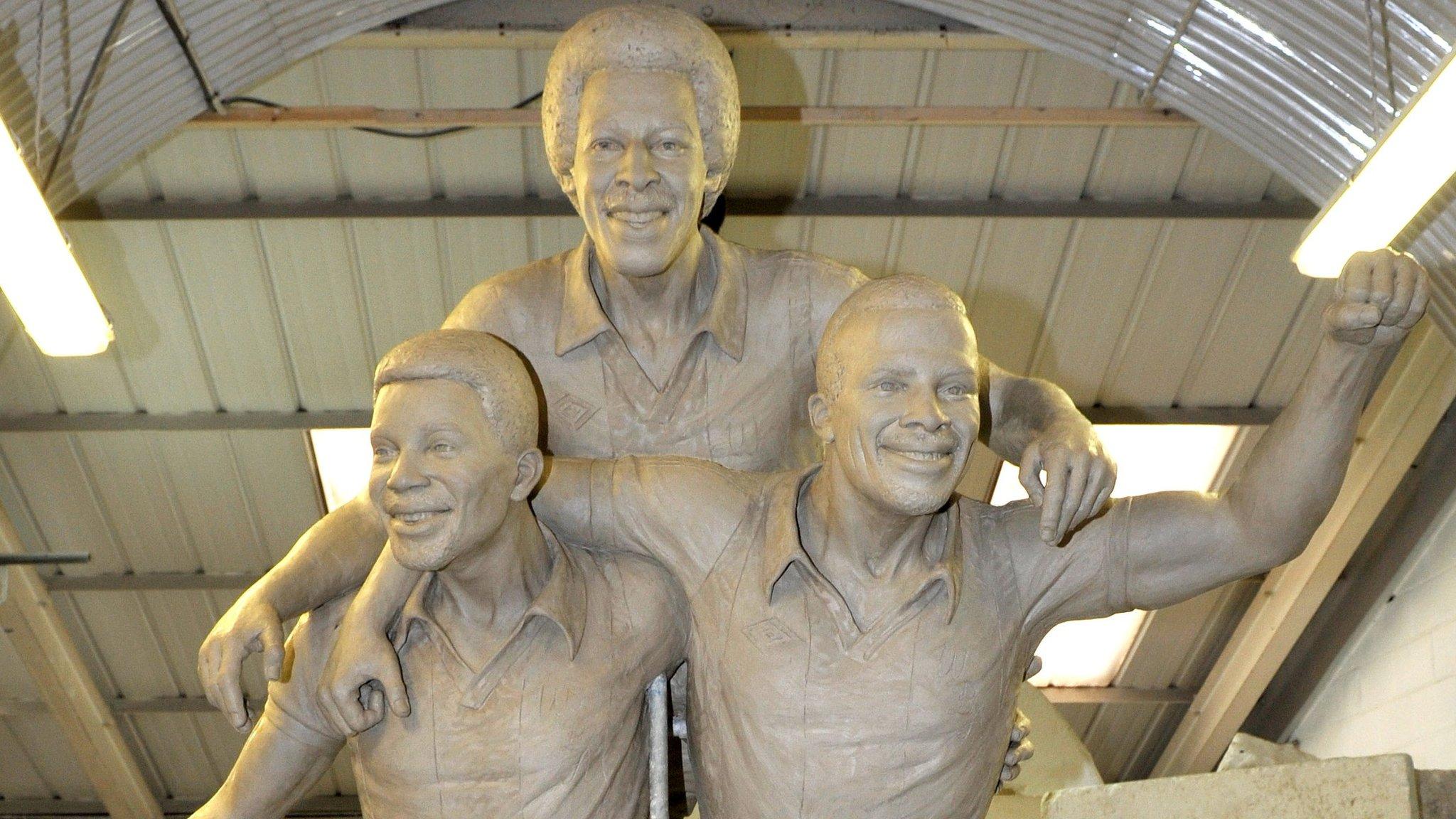Cyrille Regis: West Brom say former player was an 'iconic figurehead' of the late 70s
- Published
- comments
Brian Deane breaks down during Cyrille Regis tribute
Cyrille Regis was "one of the great symbols of the fight against racism" and "a pioneer for black footballers" across the world, West Brom say.
The former Baggies player has died aged 59 after falling ill on Sunday night.
Leading the tributes to Regis, the club describe him as "the iconic figurehead of the legendary 'Three Degrees' team of the late 1970s".
Regis, who won five England caps, played alongside Laurie Cunningham and Brendon Batson at The Hawthorns.
His widow Julia said he was "a beautiful man and a wonderful husband, father, grandfather brother and uncle".
He is survived by his two children, Robert and Michelle, and three grandchildren Jayda, Renee and Riley.
Regis, who played 297 times for the Baggies in the 1970s and 80s, was the third black player to be capped by England at the highest level, after his team-mate Cunningham and Nottingham Forest defender Viv Anderson.
Tributes pour in after the death of former West Brom star Regis
The man who gave Regis, Cunningham and Batson their nickname was the then-West Brom manager Ron Atkinson.
Reacting to the news of his death, he said Regis was "the best centre-forward", but was "a better bloke than a player".
"Every time I saw him I thought he could still play," Atkinson told BBC West Midlands. "To me and to many, many others it is a complete shock."
Regis, who was appointed an MBE in 2008,, external returned to West Brom as a coach before becoming a football agent.
And Atkinson reckons his impact on the game would have been even bigger today.
"He got five international caps but today he would get 60 or 70 at least. He never said it but I look at players who got 50 or 60 caps. He played in an era when there were some good centre forwards about. Looking at players now he would have been a sensation. You would be getting a bargain at £90m."
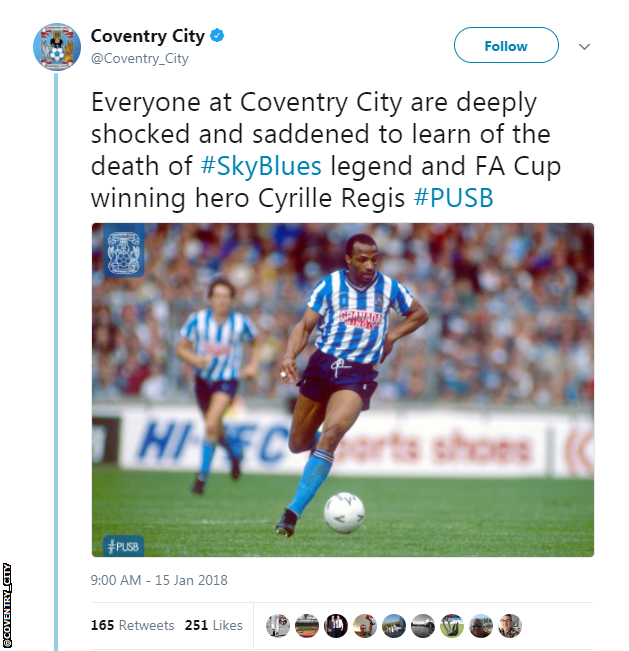
Regis won the FA Cup with Coventry in 1987
Regis scored 112 goals in 297 appearances for the Baggies before joining Coventry City for £250,000 in 1984.
Atkinson said Regis could have been on his way out of the Midlands to link up with his old boss, if he had been fit at the time.
"I almost signed him for Manchester United late on from Coventry but he was injured," said Atkinson.
"The biggest weakness in his game was he didn't score enough bad goals. Every goal he scored was a wonder goal. He must have qualified for more Goal of the Month awards than anyone else."
Regis, Cunningham and Batson were subject to racist abuse during the late 1970s, but Atkinson says Regis helped to shift opinion.
"In full flow there wasn't a better sight in football. Visiting fans took to him. I can remember us playing at Leeds and we were all getting abuse, but he scored two wonder goals and afterwards he got a standing ovation from the Leeds crowd."
Viv Anderson, the first black player to play for England, added: "Cyrille was a demon on the pitch but off it he was a kind and warm-hearted person.
"All three of them [Regis, Cunningham and Batson] were pioneers. I still look up to them. They forged a way for everybody and were admired by all, not just West Brom fans."
'The biggest smile you could imagine'
We stood on Regis' shoulders - Dublin
Former Aston Villa and Manchester United striker Dion Dublin
Cyrille Regis was my hero. I wanted to play like him.
His dignity, his self-calm and his belief in his own ability in order to respond to the fans without any actions, any verbals, he just played the game to such a high level that these fans went from throwing bananas and having the hatred towards a black man, to 'oh, he's not too bad is he?' and then cheering.
To get through what he got through, for himself, for his team and his team-mates, but for us - he was a good man.
He will be remembered with a lot of dignity - a man that had a lot of courage, a man that had immense talent and a man that had the biggest smile you could ever imagine.
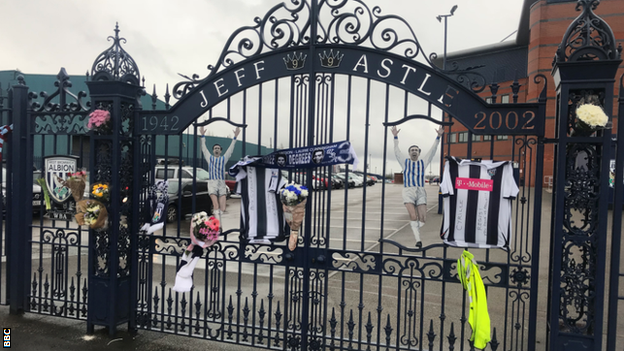
Fans have been leaving tributes at the gates outside West Brom's ground
'My absolute hero'
BBC Radio 5 live presenter and West Brom fan Adrian Chiles
He was my absolute hero. When he made his debut, he was electrifying. It was a difficult time in Birmingham in terms of race relations and then suddenly these men, especially Cyrille, were our heroes. What they went through was horrific and, psychologically, they were made of girders to deal with the horrors that were put in front of them.
The one thing everyone also said about him was that he got younger every time you saw him, he was in spectacular physical shape all the time so it's the last thing you'd expect.
I was supposed to meet him and Brendon tomorrow to organise a big celebration to mark the 40th anniversary of when Laurie Cunningham made his debut and to celebrate what the Three Degrees achieved for the club and the game. I'm just devastated.
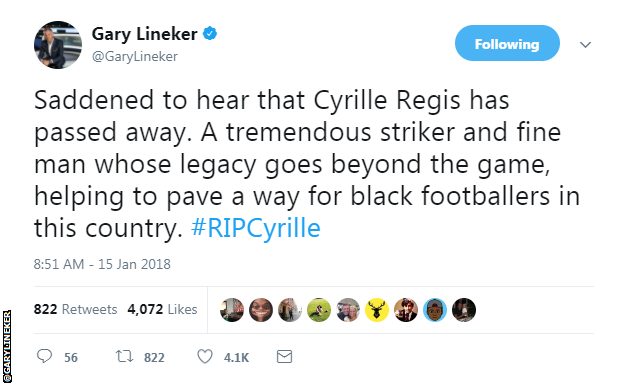
Gary Lineker said Regis' legacy will live on beyond football
Regis scored 62 goals in 274 appearances for Coventry and was a crucial part of their FA Cup-winning side in 1987. He retired from football in October 1996.
Former Manchester United and England defender Rio Ferdinand paid tribute to "a great man. Helped set the foundations for others. Always remembered".
Ebony Rainford-Brent, the retired England cricketer described him as "one of the most amazing men I have ever met".
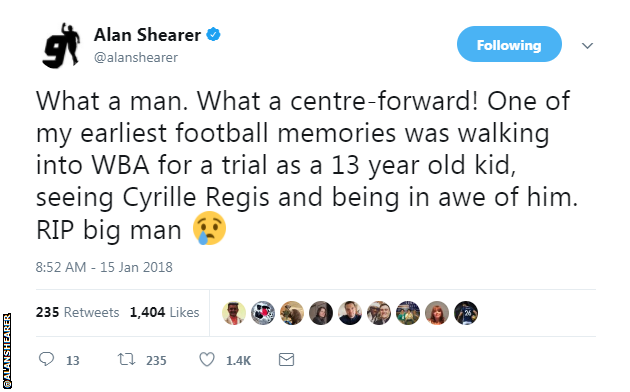
Alan Shearer met Regis during a trial at West Brom
'A role model and a trailblazer'
BBC Sport's chief football writer, Phil McNulty
Cyrille Regis was not simply an outstanding striker for West Brom and an FA Cup winner with Coventry City - he was a role model and a trailblazer for black footballers.
Regis, along with Brendon Batson and Laurie Cunningham at West Brom and the likes of Viv Anderson at Nottingham Forest, broke down barriers and demonstrated what could be achieved at a time when high-profile black players were a rarity in Britain.
And Regis did it the hard way by coming through the Isthmian League at Hayes before being spotted and signed for the Baggies by then-manager Ronnie Allen in May 1977.
It was under Ron Atkinson that he achieved the status that made him a legend at The Hawthorns; a striker of explosive, raw power and finishing who could unsettle any defence. Regis was powerful in the air, quick and a scorer of any type of goal, spectacular or scrappy.
Regis was a gentle man away from football but such was his threat on the field, particularly when subjected to heavy physical attentions from opponents, that opposing managers used to specifically instruct their players not to upset him or annoy him in any way as the results could be devastating. In full flight, Regis was a magnificent sight.
He will be remembered as one of the most significant footballing figures of his generation, not just for his impact on the field but his wider influence off it.
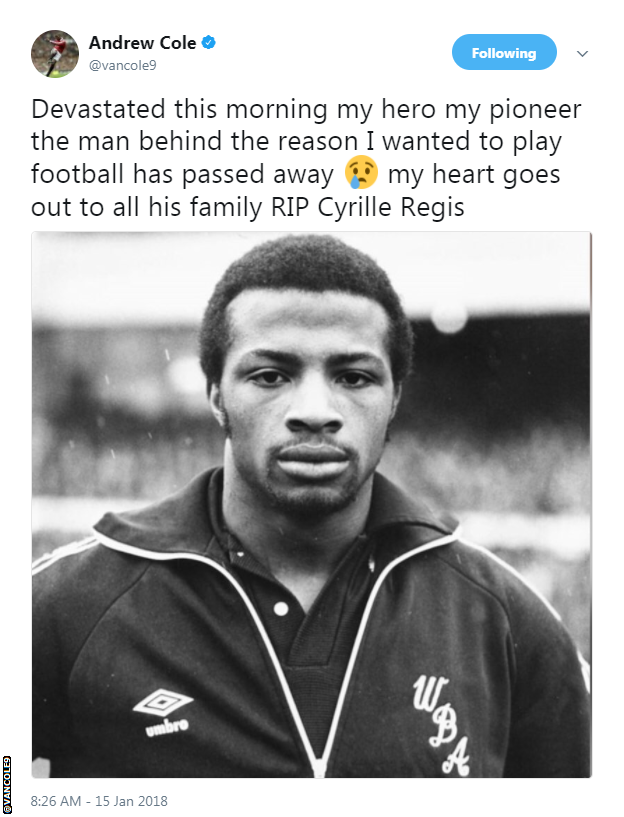
Former Manchester United striker Andrew Cole described Regis as his 'hero'
Regis, Cunningham and Batson are due to be honoured with a 10ft statue, called The Celebration, in West Bromwich. It is set to be unveiled this season, following a delay.
At a preview of the structure in 2013, Regis said: "We were part of that first generation of black players in this country and I'm sure that if you ask any second generation player they will tell you they were inspired by Laurie. That's why the statue will be so important."
Cunningham died in a car crash in Spain in 1989.
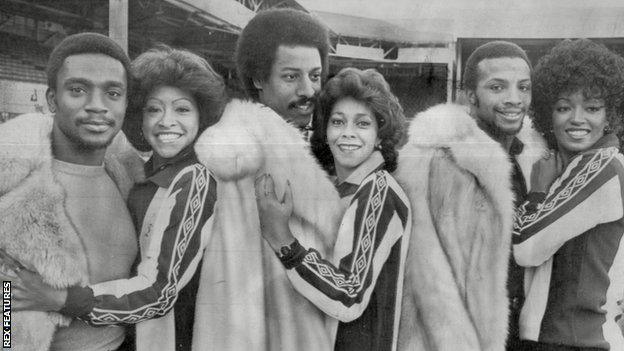
Cunningham, Batson and Regis met their namesakes, pop group The Three Degrees, in 1979
'A genuine fella'
Former Scotland striker Kevin Gallacher played with Regis at Coventry
I was a young lad coming down to England and he helped me along. His physical presence took the centre halves away and allowed me to take the glory and score the goals.
He just wanted to help you along and settle you into the club. He did the kind things, he put an arm around you. Every time you saw him at the ex-players' stuff at Coventry he always wanted to speak to you, he was such a genuine fella.
He was one of the masters, along with Brendon Batson, who helped to change the face of football. It was fantastic and that's why he got a lot of respect from fellow professionals, what he did to help the other side of football.

The FA paid their tribute to Regis on social media
The anti-discrimination body Kick It Out said: "Cyrille was a pioneer of English football, becoming one of the first iconic black players of the professional game, alongside former Albion team-mates Laurie Cunningham and Brendon Batson.
"Following his career, Cyrille was a great supporter of the organisation's work helping to tackle racism in the sport, kindly donating his time and efforts to Kick It Out on numerous occasions."
'He was an inspiration'
Former Sheffield United and Leeds striker Brian Deane
Cyrille was the main reason why a lot of young black kids looked at football and thought there was a genuine opportunity to play. He embodied the spirit of the inner cities of the time, it's just a tragedy.
In those days, the abuse was part and parcel of the game unfortunately. You couldn't stop and complain because people would say 'he's got a chip on his shoulder, he hasn't got any bottle' and really, when you look back at the abuse, what happens nowadays pales into insignificance.
Cyrille was different, he was an inspiration to a lot of black kids because he was the first one to break through. It was his presence when you were with him, he was a fantastic human being and it's a great loss.
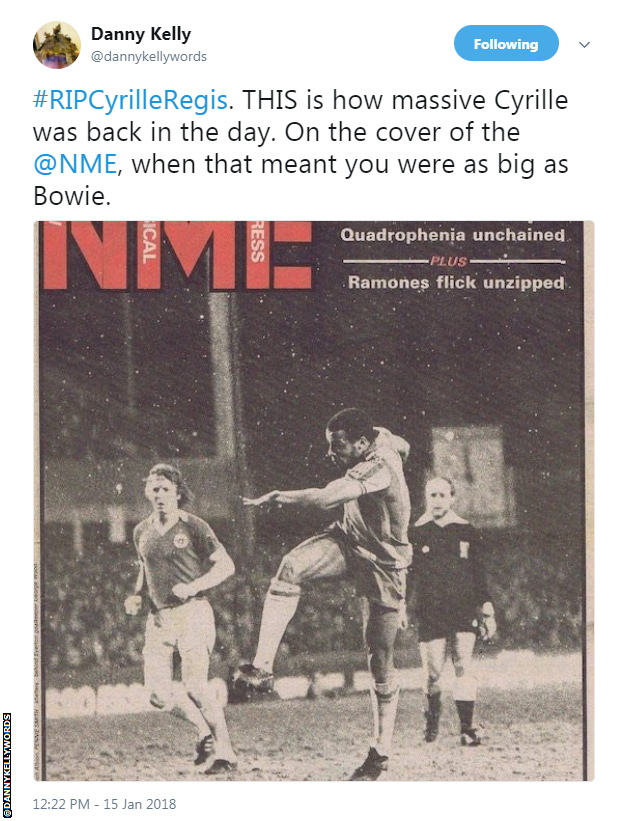
Regis' name was known beyond the football world, as pointed out by broadcaster Danny Kelly
- Published15 January 2018
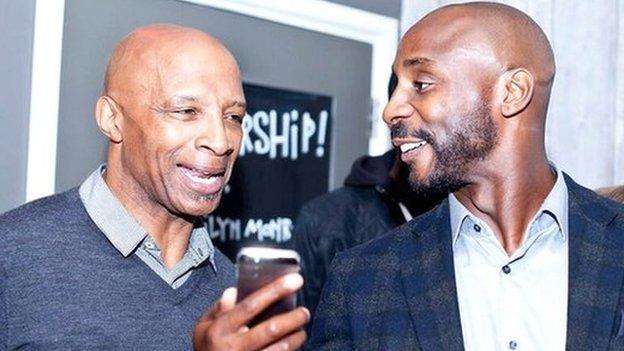
- Published15 January 2018
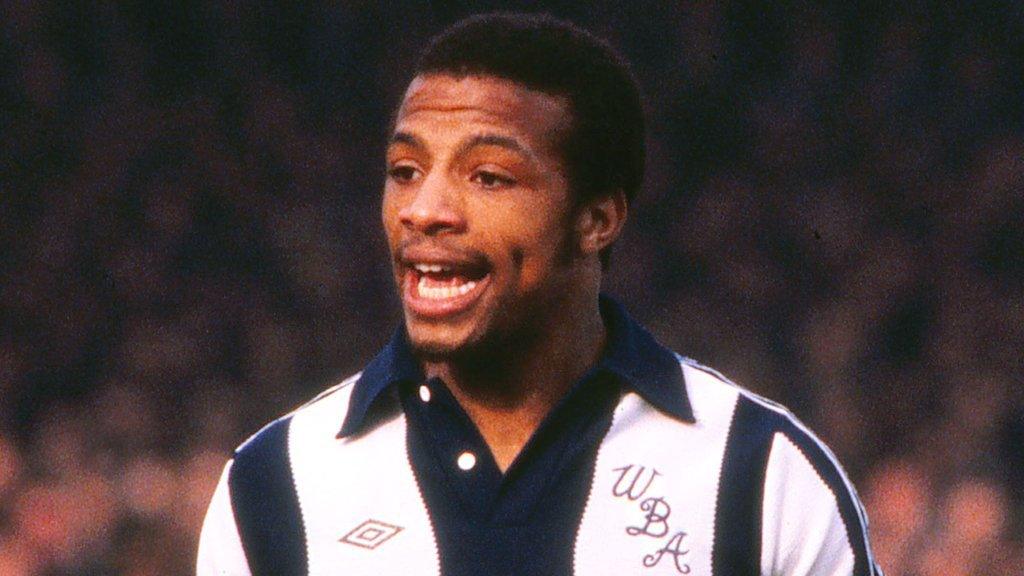
- Published15 January 2018
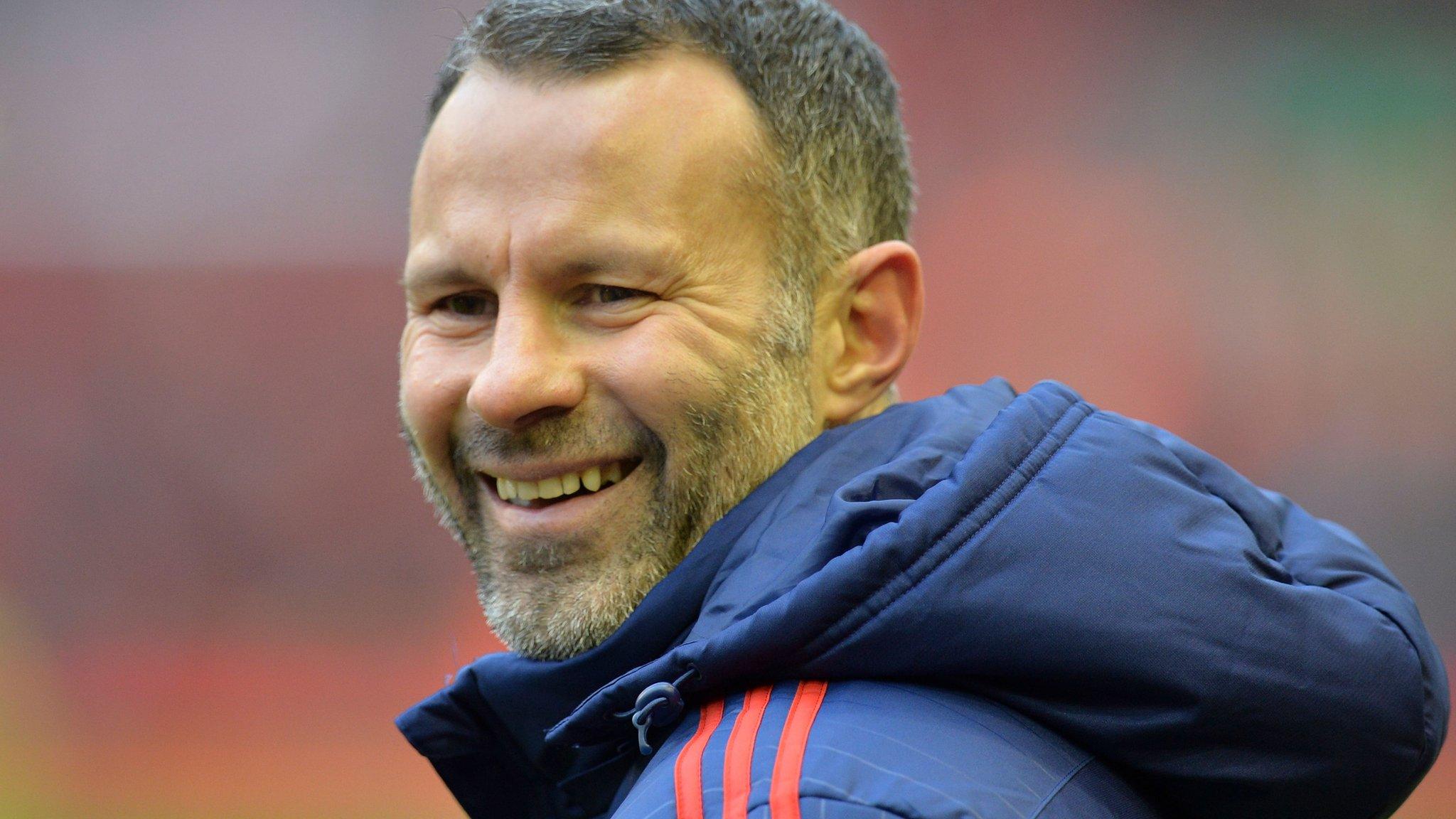
- Attribution
- Published17 November 2016
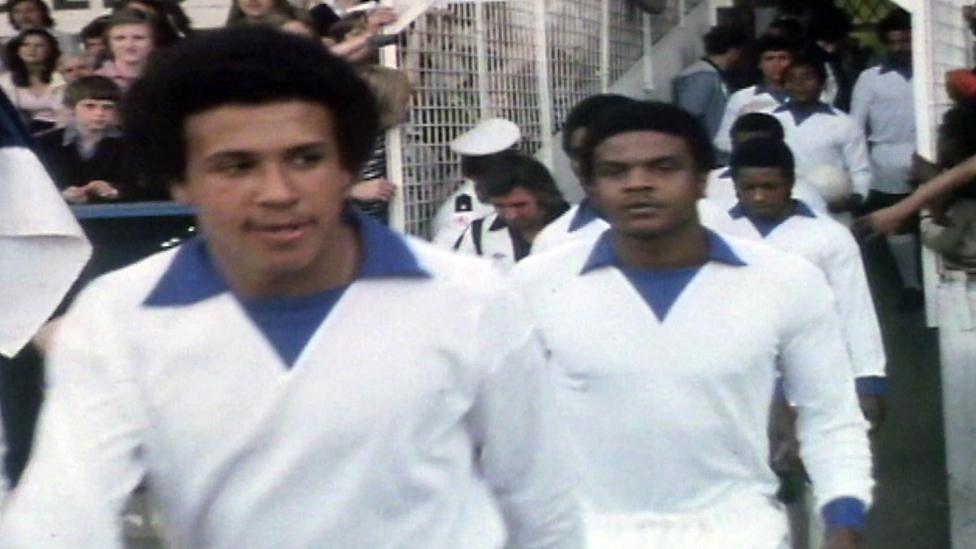
- Attribution
- Published9 April 2013
